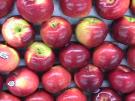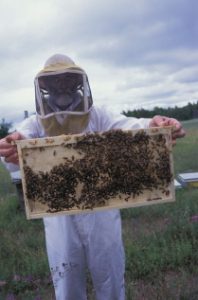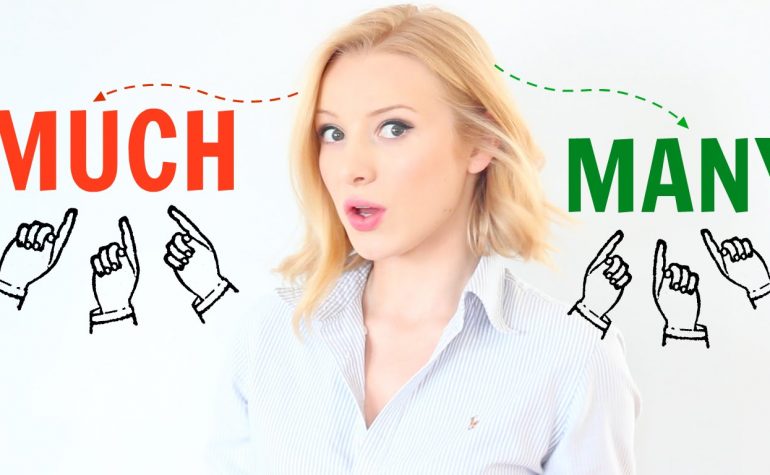Lesson eight
Many & Much
Many is used with count nouns: | |
Q: How many apples are there? A: There are many apples in this picture. |  |
Q: How many chairs are there? A: There are two chairs. |  |
Q: How many bees are there? A: Hundreds. Maybe thousands! |  |
Q: How many apples are there in this picture? A: There is only one apple. |  |
Q: How many men are there in this picture? A: There aren’t any. There is only one woman. | |
Much is used with noncount nouns: | |
Q: How much fruit is there? A: There’s a lot of fruit. |  |
Q: How much water is in the glass? A: It’s almost full. There’s a lot of water in the glass. |  |
Q: How much traffic is there this morning? A: There’s a lot of traffic. The cars aren’t moving very fast. |  |
Q: How much fishing does he do? A: He does a lot of fishing on the weekend. |  |
Q: How much beer is there in his glass? A: There isn’t any. It’s all gone. |  |
Now, watch this video:
Count Nouns Singular or Plural | Noncount Nouns (Don’t use in plural form) | |
car apple machine fact chair dollar minute (Only use an article with these: a or the) | cars apples machines facts chairs dollars minutes (These plural count nouns use “many“) | traffic fruit machinery information furniture money time (These use “much“) |
It’s important to understand the difference between noncount and count nouns when using many and much. Noncount nouns are often used to describe large categories while count nouns are usually more specific. Examples:
Noncount nouns always use a singular verb. Count nouns are singular or plural. Much and Many are usually used with the negative: Examples:
Any + not, never, or without expresses zero: Examples:
Much and Many are usually not used in the affirmative: Examples:
| ||
Practice
Exercise 1: Asking Questions with much, many, or any
1. How ______ apples are there on the table?
2. How ______ water is in the glass?
3. Do you know how ______ people are going to be at the party?
4. How _______ students came to class yesterday?
5. How _______ traffic was there on the highway?
6. Does he know how ______ money he needs to go to college?
7. Are there _______ customers in the store?
8. How ________ rice did you make?
9. Do you know how _______ it costs to take the bus?
10. Is there _______ room on the bus for me to sit down?
Exercise 2: Negative + much, many, or any.
1. There aren’t ______ students in class today. (small amount)
2. There isn’t _______ water in this glass. (small amount)
3. There aren’t ______ apples in the basket. (zero)
4. She doesn’t have very _______ friends. (small amount)
5. My gas tank is empty. I don’t have ______ gas. (zero)
6. Those homeless people don’t have _______ money. They’re very poor. (zero)
7. I didn’t know ______ people at the party . I talked to just a few of my friends. (small amount)
8. There isn’t _______ snow this January in Minnesota. There are only a few inches. (small amount)
9. The computer never makes ______ mistakes, but people who use computers frequently do. (zero)
10. There wasn’t ________ business today at the restaurant, so I left early. (small amount)
Exercise 3: Fill in the blank with “much” or “many.” (20 points)
1. He doesn’t have ____________ time today.
2. How __________ apples are there in the basket?
3. I didn’t see __________ cars on the highway this morning.
4. How _________ money do you have?
5. There isn’t __________ milk in the refrigerator.
6. There were _________Spanish-speaking people at the party.
7. Do you know how _________ people there are in the world?
8. We didn’t send __________Christmas cards to our friends this year.
9. Did you see how _________ food there was in that store?!
10. How _________ information can you find on the internet?
11. How _________ chairs do we need for the classroom?
12. She doesn’t need very ________ time to finish her work.
13. There were too _________ bees at the park, so we left.
14. There is too __________ pollution in the world.
15. I couldn’t find very ________ rice at the store today.
16. How _________ help do you need?
17. There were __________ butterflies outside.
18. She doesn’t have _________ teeth left in her mouth.
19. We saw _________ police officers outside of our house.
20. How __________ coffee do you drink every day?
Congratulations!!!
Your score
